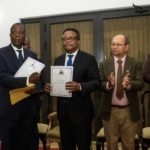Divisional Commissioner Jean Alex Pierre-Louis was sworn in on Friday as the new regional director of Haiti’s National Police (PNH) in the Artibonite region. He replaces Jacques Ader, who was dismissed after being implicated in the controversial death of Wilford Ferdinand, known as “Tiwil,” during a police operation in Raboteau, Gonaïves.
The incident sparked immediate, intense outrage across the department. Former comrades of Tiwil, a prominent figure in the Gonaïves Resistance Front, and frustrated residents flooded the streets, demanding the immediate removal and arrest of the outgoing director. For days, protesters barricaded the national highway, severely disrupting vital traffic between Gonaïves and Saint-Marc.
Armed gangs control significant parts of Artibonite, especially in the Lower Artibonite around Liancourt, Petite-Rivière, Verrettes, and Gros-Morne. These groups, often linked to networks in the capital, impose their own rules and commit kidnappings, looting, and extortion.
Five police directors have led the region in the past five years, but violence has continued. High turnover has weakened the PNH’s authority, already strained by shortages of resources and support. Several police stations have been abandoned due to gang pressure.
“We are perilously short of the means to confront gangs that are not only better armed but also better organized,” a police officer warned, speaking on condition of anonymity.
In 2020, Jean Alex Pierre-Louis, a former West Department police chief, is known for his firm approach and rapport with the rank-and-file. At his installation, he vowed to “make every necessary sacrifice” with his officers to “restore public order” and “bring the perpetrators of barbaric acts to justice.”
“Artibonite must not remain a lawless zone. The population has suffered enough,” he said in his inaugural address. He also announced tighter coordination among police, local authorities, and the judiciary to relaunch joint security operations in rural areas.
According to several PNH sources, the new director intends to reorganize territorial units and reassign personnel to the most exposed zones, especially along the strategic corridor between L’Estère and Saint-Marc, a vital route for moving goods between the North and Port-au-Prince.
On the eve of his appointment, several light armored vehicles were delivered to the regional command. One vehicle was deployed to Gros-Morne, another to Petite-Rivière, with others positioned in the Lower Artibonite. The delivery is part of a new national redeployment plan announced by the PNH high command, supported by logistical assistance from the United Nations Integrated Office in Haiti (BINUH).
Yet many observers insist these reinforcements are dangerously inadequate in the face of the gangs’ overwhelming firepower and mobility. “One or two armored vehicles won’t change the equation,” warned a civil society member in Gonaïves. “We need a sustained strategy, not symbolic gestures.”
In Gonaïves’ markets and working-class neighborhoods, an air of exhaustion and skepticism is palpable. Residents warn that leadership changes now inspire little confidence. “Every new director promises security, but the situation keeps deteriorating,” lamented a shopkeeper in Raboteau.
Insecurity has brought agricultural production in the Artibonite Valley to a virtual standstill. Thousands of hectares of rice and corn lie abandoned amid relentless violence, rapidly worsening the nation’s food crisis.
Jean Alex Pierre-Louis’s appointment is widely seen as a significant test for both the PNH and the transitional government, which faces criticism for not reasserting state authority beyond Port-au-Prince. The new chief must address weak public trust, mobilize a police force with scarce resources, and secure sustained logistical support to make any lasting difference—a daunting set of challenges as violence and instability escalate.
All eyes are on him. His ability to deliver real security gains—not just promises—will shape his legacy and the hopes of Artibonite’s long-suffering population.







